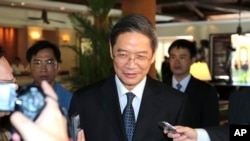Taiwan's top policymaker on Beijing issues announced he will travel to mainland China next month for the first high-level contact between the two sides since 1949, but warned that he would not discuss “sensitive political issues.”
Mainland Affairs Minister Wang Yu-chi said Tuesday his trip was "crucial" for further institutionalizing China-Taiwan ties, which have warmed in recent years.
Wang will meet his Chinese counterpart, Vice Foreign Minister Zhang Zhijun, who heads the Taiwan Affairs Office, in the southern city of Nanjing and in Shanghai from February 11 until February 14. The talks mark a big step towards expanding cross-Strait dialogue beyond economic and trade issues.
Speaking to reporters, Wang said the aim of the talks was to create “a normal communication mechanism so as to avoid misunderstandings.”
China's ruling Communist Party considers Taiwan a renegade province and has never ruled out the use of force to bring the island under its wing after taking control of the mainland in 1949. Despite this, economic ties have grown considerably in recent years.
Economic ties improved in recent years, especially after the somewhat Beiing-friendly Ma Ying-jeou was elected president in 2008 and re-elected in 2012. However, booming trade has not brought progress on political reconciliation or reduced military readiness on both sides.
In October, Chinese President Xi Jinping said a political solution to the standoff could not be postponed forever. Across the Strait, Taiwan President Ma Ying-jeou later said he saw no urgency for political talks and wanted to focus on trade.
Taiwan and China will discuss setting up representative offices in both places, Taiwan's participation in international bodies and issues on medical care for Taiwanese students in China, Wang said.
The talks were “an important move,” said Ma Xiaoguang, a spokesman for China's Taiwan Affairs Office, according to state news agency Xinhua.
“We hope and believe that this important step by both sides of the Strait will be conducive to enhancing communication and understanding as well as the joint promotion of future development of cross-Strait ties,” Ma said.
The officials will meet in the southern city of Nanjing and China's commercial capital, Shanghai.
Nanjing was briefly the Chinese capital during the turbulent 1920s, when Taiwan's Nationalist party ruled most of the country. The city is also the burial place of Sun Yat-Sen, the founder of modern China, who is revered by both China and Taiwan.
Despite the close economic ties between China and Taiwan, U.S.-armed and backed Taiwan remains a potential flashpoint and its recovery is a priority for China's ruling Communist Party, which is investing billions to modernize its military.
Some information in this report was contributed by Reuters.
Mainland Affairs Minister Wang Yu-chi said Tuesday his trip was "crucial" for further institutionalizing China-Taiwan ties, which have warmed in recent years.
Wang will meet his Chinese counterpart, Vice Foreign Minister Zhang Zhijun, who heads the Taiwan Affairs Office, in the southern city of Nanjing and in Shanghai from February 11 until February 14. The talks mark a big step towards expanding cross-Strait dialogue beyond economic and trade issues.
Speaking to reporters, Wang said the aim of the talks was to create “a normal communication mechanism so as to avoid misunderstandings.”
China's ruling Communist Party considers Taiwan a renegade province and has never ruled out the use of force to bring the island under its wing after taking control of the mainland in 1949. Despite this, economic ties have grown considerably in recent years.
Economic ties improved in recent years, especially after the somewhat Beiing-friendly Ma Ying-jeou was elected president in 2008 and re-elected in 2012. However, booming trade has not brought progress on political reconciliation or reduced military readiness on both sides.
In October, Chinese President Xi Jinping said a political solution to the standoff could not be postponed forever. Across the Strait, Taiwan President Ma Ying-jeou later said he saw no urgency for political talks and wanted to focus on trade.
Taiwan and China will discuss setting up representative offices in both places, Taiwan's participation in international bodies and issues on medical care for Taiwanese students in China, Wang said.
The talks were “an important move,” said Ma Xiaoguang, a spokesman for China's Taiwan Affairs Office, according to state news agency Xinhua.
“We hope and believe that this important step by both sides of the Strait will be conducive to enhancing communication and understanding as well as the joint promotion of future development of cross-Strait ties,” Ma said.
The officials will meet in the southern city of Nanjing and China's commercial capital, Shanghai.
Nanjing was briefly the Chinese capital during the turbulent 1920s, when Taiwan's Nationalist party ruled most of the country. The city is also the burial place of Sun Yat-Sen, the founder of modern China, who is revered by both China and Taiwan.
Despite the close economic ties between China and Taiwan, U.S.-armed and backed Taiwan remains a potential flashpoint and its recovery is a priority for China's ruling Communist Party, which is investing billions to modernize its military.
Some information in this report was contributed by Reuters.




